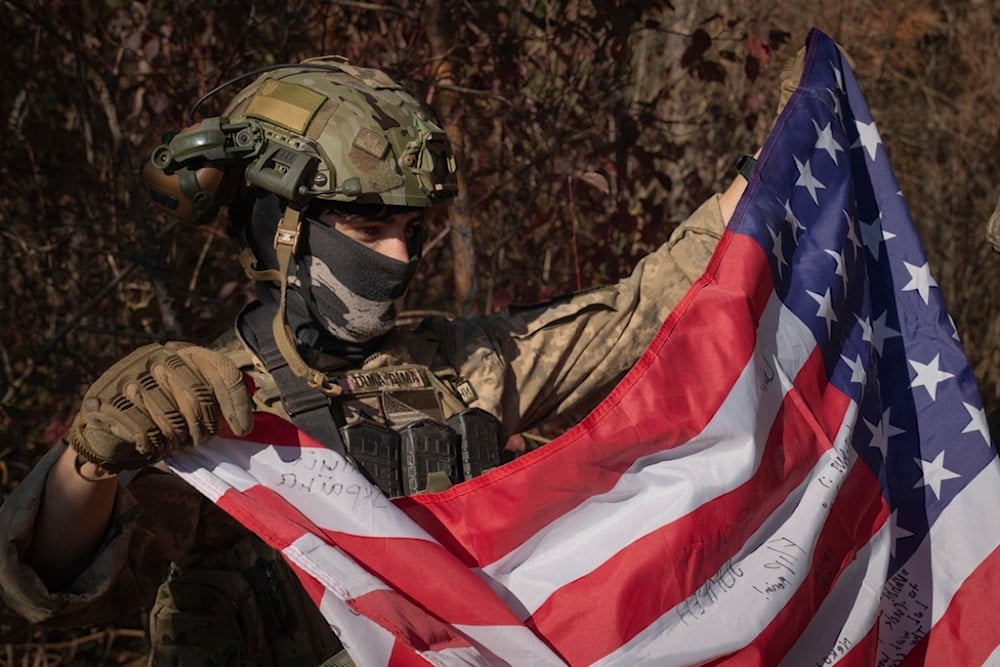Ex-CIA analyst: US deeply immersed in Ukraine war from outset
Retired CIA officer Larry Johnson claims that the involvement of foreign militants in a thwarted Ukrainian attack on Russia showcases NATO's desperation.
-

A US mercenary who serves with the 23rd separate rifle battalion of Ukraine's Armed Forces holds the US flag near the front line in the Kharkov region, on Saturday, Oct. 26, 2024. (AP)
Retired CIA intelligence officer and State Department official Larry Johnson stated that the involvement of foreign militants in a recently foiled Ukrainian cross-border assault on Russia reflects "desperation from NATO and the West," regardless of whether these militants were "part of an official NATO force" or acting as mercenaries.
Johnson asserted that this situation evidently demonstrates that NATO countries have personnel fighting on behalf of Ukraine, highlighting the irony given the unfounded allegations from the West that soldiers from the Democratic People's Republic of Korea are supposedly fighting for Russia.
Circling back to the most recent failed attack on Russia, Johnson stressed that it was not a Ukrainian-planned aggression, rather, he said it was "clearly planned by intelligence operatives."
"The primary CIA presence in Ukraine is what was known as special operations division, it's a paramilitary force," Johnson remarked, adding that "they've been there from the outset, trained to carry out missions like this, sabotage missions, raids."
He also argued that this incident should not be viewed as a sign of the US' growing involvement in the Ukrainian conflict, since the US has been deeply engaged from the very beginning.
"It's just that now it's becoming perhaps, this could be used as evidence to present that. But I think the reality is the United States has been directly involved with this from the outset," Johnson explained.
Ukraine incursion in Kursk struggles as Russians retake territory: WP
A report by The Washington Post on October 25, said, "As President Volodymyr Zelensky traveled through Europe and the United States to promote his “victory plan” aimed at resolving the war with Russia, Ukrainian forces encountered significant setbacks on the battlefield."
Analysts indicated that Russian forces may have retrieved up to half of the territory that Kiev originally captured during its summer offensive into Russia’s Kursk region. According to The Washington Post, this concerning shift calls into question the effectiveness of Ukraine’s military strategy amid the ongoing conflict.
The incursion into Russia was initially celebrated by Ukrainian officials as a success, however, recent Russian counterattacks in the Kursk region have raised concerns about how long Kiev can maintain control over the territory.
The Institute for the Study of War, which has been closely monitoring the conflict, reported visual evidence indicating that Russian forces have regained control of 46% of the territories in the Kursk region.
Russian President Vladimir Putin said that pockets of Ukrainian forces in the region had been encircled, however, this assertion was strongly disputed on Friday by Oleksandr Syrsky, the commander of Ukraine’s armed forces, according to WaPo.
He posted on Telegram, “Ukrainian forces continue active operations in the Kursk direction, for the third consecutive month, destroying the enemy’s combat potential,” adding that “despite the immense pressure from the enemy on this front, the occupiers are suffering significant losses in personnel and military equipment.”
The Washington Post stated that Ukraine’s recent losses in Kursk highlight the country’s ongoing military struggles even as talks to end the war continue, adding that Russia has steadily gained ground in Ukraine’s eastern Donetsk region and has recently made further advances in the northeastern Kharkiv region, aiming to reach the city of Kupyansk.
Kiev's territorial gains in the Kursk region were featured in Zelensky's victory plan, with Ukrainian officials portraying the incursion as a potentially significant leverage point in future peace negotiations, however, Russia’s recent advances are reframing the perspective, according to the report.
“I don’t think we can talk about the large-scale Russian offensive that could push the Ukrainians out just yet,” said Franz-Stefan Gady, a Vienna-based military analyst. “I think we’re still in a shaping phase — that is, in a preliminary phase before a larger-scale assault — and the major objective of the Russian forces currently is to [weaken] Ukrainian forces with artillery and drone strikes.”
“They’re essentially just testing the weaknesses of the Ukrainian defenses, so the incursion’s still fairly limited. And I think what’s concerning is that the Ukrainians are indeed actually already in this phase of being pushed back,” he added.
Read more: Zelensky 'Victory Plan' pushes NATO toward WWIII: French party leader

 4 Min Read
4 Min Read









